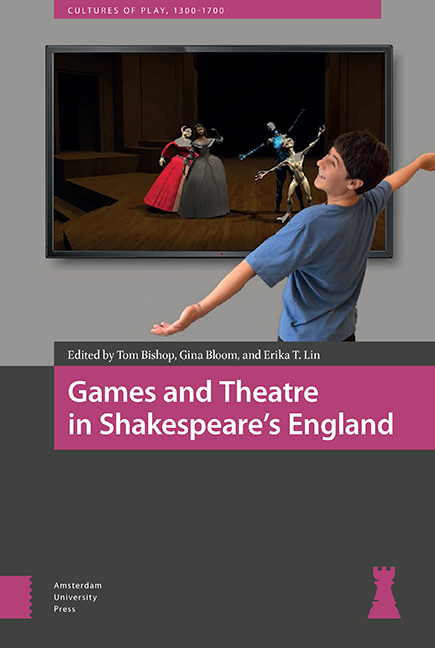6 - Bowling Alone, or The Whole Point of No Return
Published online by Cambridge University Press: 21 October 2021
Summary
Abstract
The anonymous Look About You of 1600 calls for a game of bowls that dilates upon the sport's propensity to run away with itself. In the midst of a game at bowls played in prison, one character excuses himself for a moment. At that point the other borrows his clothes and escapes in his guise, leaving his competitor “bowling alone,” a victim of social isolation. This chapter argues that bowling offers early modern theatre a theory of isolation but also proximity, velocity, and writing. Indeed, bowling materializes theatre's sense of its proxemics and ultimately theatricalizes the relationship between dramatic fiction and space, and even offers a plangent metaphor for the role of the writer and his hopes for a return.
Keywords: bowling; Look About You; velocity; proxemics
To give you the moral of [bowling], it is the emblem of the world.
‒ Charles Cotton“Thus far, with rough and all-unable pen,/ Our bending author hath pursu’d the story,” writes Shakespeare—the least sincere line of his most insincere drama, Henry V. But how far is “thus far”? Is it a time or a place, a duration or a location? Shakespeare is definitely thinking about space since the Chorus complains about close quarters—“In little room confining mighty men” (epil.3). “[L]ittle room” is clear enough, then—the place, elsewhere, of “great reckoning[s]” (As You Like It, 3.3.15). It's the cramped quarters of the “cockpit” (Henry V, prol.11) into which the writer has confined his work. Maybe that's why he's bending.
“Thus far” is a place, then. The line's a workplace gripe about a tiny office. But an instant later the epilogue mentions the “[s]mall time” in which this “star of England” lived (epil.5, 6). “Small time”? Like you could slap a handle on time and stow it in the overhead. “Brief” would have scanned, but here the temporal duration of this history play is deliberately spatialized, and vice versa. The notion, at the end, is that you’ve come along way without getting anywhere. Little room, small time: “thus far” is both a geographical and chronological span, the one the other in a form of theatrical synesthesia.
In a marginally less well-known history play, James IV, Robert Greene has King Arius announce that “thus far the English peeres have we displayed/ Our warring ensigns with a happy warre.”
- Type
- Chapter
- Information
- Games and Theatre in Shakespeare's England , pp. 159 - 178Publisher: Amsterdam University PressPrint publication year: 2021



